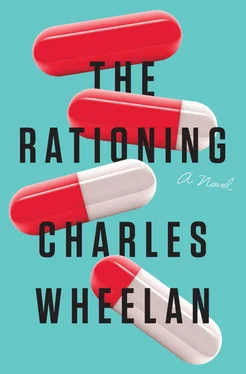The Communications Director interjected, “We probably don’t have too long before the document gets leaked to the press. Shall I draft a statement? Even if we haven’t come to agreement here, I can say something about how we are weighing—”
“No,” the President said sharply.
“No statement, or no to the idea of being noncommittal?” the Communications Director asked.
“No statement. I’d like to speak with the Majority Leader,” the President instructed. “As soon as he’s on the line, I want the room.” The advisers began filing out of the conference room so that the President could speak with the Majority Leader in private. “We should just release the agreement,” the President added.
“Leak it?” the Communications Director asked.
“Just release it to the press.”
“And what kind of statement should we make?”
“None.”
“I don’t understand,” the Communications Director said.
“Just make the agreement public,” the President said firmly. “Release it to the press. The American people should know what the Chinese government is asking in exchange for the Dormigen.”
“With respect, sir, we should try to put our own spin on this.”
“What is there to spin? It speaks for itself.”
The Communications Director looked around the room, hoping to find some nonverbal support for his case. Like all the President’s senior advisers, he was expected to walk a fine line between offering candid advice and carrying out the President’s orders. “This is our only chance to frame the story,” he said.
“Take the document to the back of the plane and hand it to a reporter,” the President said.
The Communications Director picked up a spare copy of the agreement from the conference table but did not move toward the door, prompting the Strategist to interject, “The reporters are the cranky, poorly dressed people in the last cabin.”
The Chief of Staff, seeking to ameliorate the tension, said, “Give it to the AP correspondent. She’ll share it with the press pool.”
The Communications Director continued to plead his case: “Maybe we do a photo op of some sort, with the President reading the document—”
“Just release it,” the President said angrily. “Don’t make me walk it back there myself.”
One can second-guess a lot of the decisions made during the Outbreak, from the President on down, but this moment suggests to me that there is such a thing as political talent—just like athletic talent, or entrepreneurial instinct, or acting ability. I do not know if people are born with political talent, or if they acquire it through hard work and experience, or perhaps both. I do know that the President was elected student body president when he was in high school. He was elected editor of the Law Review at the University of Virginia. If one counts every election and reelection he participated in—from high school to the White House—there were sixteen times when he got more votes than the next man or woman (and two times when he did not, which might teach the more valuable lessons). As much as we despise politicians, the President had something that his Chinese counterparts did not: a feel for voters.
IT TOOK A FEW MINUTES TO CONNECT THE PRESIDENT WITH the Senate Majority Leader, who had been given a copy of the “Friendship Agreement” immediately after the Chinese Ambassador delivered it. “How are you doing, Mr. President?” the Majority Leader asked.
“I’ve had more enjoyable trips to Hawaii,” the President said. “What do you think of the Chinese offer?”
“I’m in shock,” the Majority Leader said. “Do they really expect us to accept this?”
“It’s an opening bid,” the President replied.
“Yes, but they’ve completely ceded the moral high ground. Did you see that thing about the UN parking? They come across as completely opportunistic, predatory even.”
“That was my reaction,” the President said.
“Are you going to make a counteroffer?” the Majority Leader asked.
“What do you think?”
“I don’t think there is a deal to be had. Never mind troops in Korea and Japan, at a minimum they are going to ask us to walk away from the South China Sea Agreement.”
“Yes,” the President agreed.
“That leaves us in a tough spot.”
“The NIH has raised their fatality projections because of all the Dormigen that’s gone missing,” the President reminded him.
“If you turn away the Chinese offer, you’ll have my complete support,” the Majority Leader assured him. “I want you to know that. I’m confident I can get the Senate behind whatever you decide.”
“I don’t care about the Senate, to be honest,” the President replied. “Could you sell it to a Rotary Club?” The President had enormous respect for the Majority Leader’s emotional connection to Main Street. The President’s senior advisers could speak compellingly of the Berlin Airlift and the Cuban Missile Crisis. The Majority Leader could connect with Americans who had never heard of the Berlin Airlift and had only a vague sense of how the Cuban Missile Crisis played out. That was why the President called him first.
There was a pause as the Majority Leader considered the question. “This situation with Cecelia Dodds, that makes it harder. They moved her to intensive care, you know.”
“Yes,” the President acknowledged.
“It reminds people of the reality. If we have to go to some kind of rationing… shit. A lot of people are imagining someone they love in that ICU, not able to get the pill that would send them home healthy.” There was a brief silence during which the President did not respond. The Majority Leader continued, “On the other hand, I think the Chinese have made it easier for us. This offer they’ve made says a lot about their designs in the region. If you were to give in to them, it would feel like appeasement.”
“Yes, but when people start dying in hospitals because there’s no Dormigen, is anyone going to care about troops in South Korea?” the President asked.
“I don’t think that’s the right way of looking at this,” the Majority Leader said. “You can’t make it about South Korea or carbon emissions or overfishing or any of that other wonky stuff. I can’t sell any of that at a Rotary meeting. I can’t justify Americans dying because we’re trying to play policeman around the world.”
“Okay,” the President said, inviting him to continue.
“But nobody likes a bully. Nobody likes to be taken advantage of. Most Americans know enough history to appreciate that there are good guys and there are bad guys and that you can’t let the bad guys get away with doing bad things. You’ve got to stand up to them.”
“I need to make this about standing up to China,” the President said.
“I think that’s right,” the Majority Leader affirmed. “When the United States needed medical help, the Chinese leadership made a grab for power. It’s like someone who knows you’re at the hospital visiting your sick wife, so they break into your house.”
“But they haven’t violated any laws,” the President pointed out. “They’re not actually doing anything wrong, other than driving a hard bargain. Isn’t that what diplomacy is about? I don’t think the analogy works.”
“Then find a different one,” the Majority Leader said quickly. “How about this: You need heart medicine to keep you alive. One week you come up a little short and you can’t afford it. Your rich neighbor comes over to your house and says, ‘Sure, I’ll spot you the money for your medicine. Just let me fuck your wife.’ How about that?”
“I’m not sure that would work with a Rotary Club.”
Читать дальше












